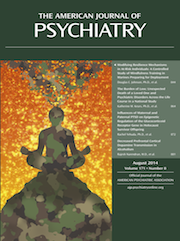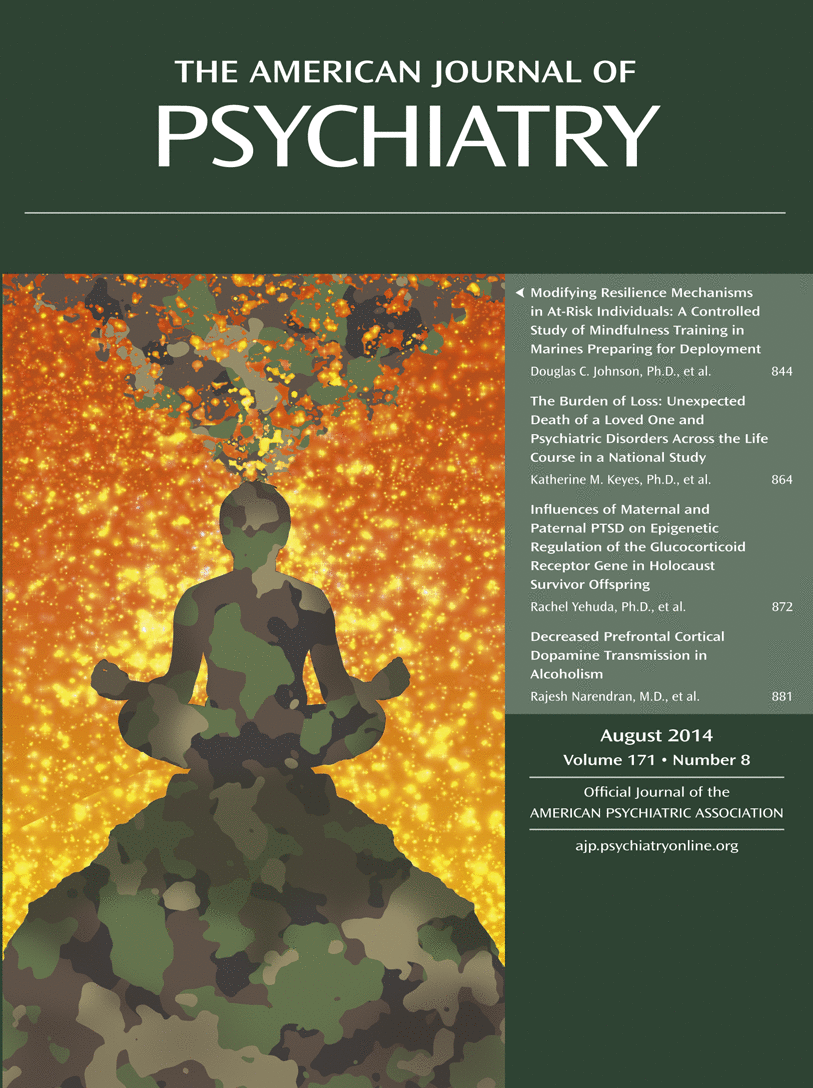Trauma affects us deeply, and according to the study by Yehuda et al. (
1), in this issue of the
Journal, it touches us down to our genes. This research brings new meaning to the concept of gene-by-environment interactions, showing that it is not one or the other that shapes us but both, or as Shakespeare’s
Hamlet put it: “There’s a divinity that shapes our ends, Rough-hew them how we will.” Environment shapes at least the expression of our genes. Epigenetics is teaching us that Lamarck, who preached the inheritance of acquired characteristics, was not entirely wrong. While our genetic code itself may not change, its relative expression does, and this tendency for our genes to be differentially productive can be heritable. Our germline of some 26,000 genes is implicit information that has its effect on our structure and function only to the extent that these genes are transcribed into RNA and translated into protein. The potential to do that is the domain of epigenetics and involves control processes such as DNA methylation at a specific promoter region, which tends to inactivate gene expression.
We have learned that early life experience can shape gene expression (
2,
3). Meaney et al. (
3) showed that maternal licking and grooming of rat pups alters the epigenome of genes involved in hypothalamic-pituitary-adrenal (HPA) activity. Then, in cross-fostering studies, it was demonstrated that these effects can be transmitted through the germline to the next generation (
4). Now, Yehuda et al. (
1) have taken the next step. In a more complex clinical study of human offspring of Holocaust survivors, they have demonstrated paternal transmission of epigenetic changes associated with Holocaust survivorship. Here, the relative effects of maternal and paternal posttraumatic stress disorder (PTSD) on DNA methylation of the exon 1
F promoter of the glucocorticoid receptor gene
NR3C1 and its relationship to glucocorticoid receptor sensitivity were examined in the peripheral blood mononuclear cells of 80 offspring of Holocaust survivors and 15 demographically matched control subjects. Methylation inhibits gene expression, and that higher methylation of the promoter reduces transcription of the glucocorticoid receptor gene, leading to fewer receptors and glucocorticoid resistance. The authors found this pattern of higher DNA methylation among offspring with a father, but not a mother, who had PTSD. In cases in which both parents had PTSD, methylation levels were lower rather than higher. This lower methylation was associated with greater sensitivity to cortisol suppression in response to administration of low-dose (0.5 mg) dexamethasone, which was previously shown to be associated with PTSD (
5). In a related study involving the same sample examined in the present study, Yehuda et al. found that maternal, but not paternal, PTSD was associated with increased glucocorticoid receptor sensitivity (
6). Among combat veterans, they showed that a diagnosis of PTSD was also associated with lower NR3C1-1
F promoter methylation and, in turn, with higher sensitivity to cortisol suppression by 0.5 mg of dexamethasone (
7). Thus, this HPA biomarker of PTSD was transmitted by maternal, but not paternal, PTSD.
These findings of Yehuda et al. could be interpreted as indicating that only maternal, and not paternal, PTSD dictated gene expression in offspring, since lower methylation levels occurred if mothers had PTSD, whether or not fathers did. However, Figure 1 of their article indicates that methylation levels in offspring of fathers with PTSD were actually higher (although not significantly so) than that seen in control subjects whose parents did not have PTSD. The difference between those with both parents with PTSD and those who had only a father with PTSD was significant. Thus, maternal PTSD seems to neutralize or override the effect of paternal PTSD. That process remains to be understood. Hypermethylation of this same glucocorticoid gene promoter has been found in the postmortem hippocampi of suicide victims with a history of childhood abuse (
8).
Interestingly, paternal, but not maternal, PTSD was associated with dissociative experiences in offspring, and among those who had both parents with PTSD, their symptoms were more likely to include dissociative amnesia. This suggests a functional dimorphism and raises the question of a different psychobiology of the new dissociative subtype of PTSD in DSM-5 (
5). The criteria for this subtype include qualifying for a diagnosis of PTSD plus having depersonalization and/or derealization as well. Such a new category had been suggested for some time, based on clinical observation, latent class analysis, neuroimaging, and epidemiological data (
9–
13). A recent epidemiological study involving a World Mental Health Survey of 25,018 people from 16 countries found that 14.4% of those with PTSD also had the dissociative symptoms of depersonalization and derealization. They were characterized by higher levels of re-experiencing symptoms, onset of PTSD in childhood, high trauma exposure and childhood adversities, severe role impairment, and suicidality (
14). This raises the question of whether those with the dissociative subtype would not show the typical hypersensitivity to dexamethasone suppression seen among the majority with the hyperarousal type.
The Yehuda et al. study is well enough designed to take care of some potentially confounding variables, making interpretation of the results clearer. It provides a convincing demonstration of genetic transmission because it rules out the “cycle of violence” explanation. Some parents who have experienced trauma also transmit it to their offspring, so it can be difficult to separate child abuse effects from parental trauma experience. In this sample, there were low levels of parentally inflicted trauma. The population was also well educated and had little history of substance abuse.
The study also raises further questions. The fact that there was a different direction of the effects of parental PTSD suggests that genome-wide profiling of gene expression might well reveal many other similar interactions. Additionally, this study demonstrates transgenerational transmission but raises the question of whether there would also be impact on the next generation. It is possible that epigenetic transformation and transmission only occurs when the parental generation is symptomatic.
This study is particularly useful in linking a clearly defined psychiatric diagnosis to epigenetic variability in a gene crucial to hormonal stress response that is, in turn, linked to a known HPA effect of the disorder (i.e., hypersensitivity to suppression of cortisol by dexamethasone). The psychophysiology affected by the expression of this particular gene is linked to known psychobiology. It provides a model for other studies linking psychiatric symptoms and known associated physiological dysfunction to gene expression. This kind of focused study relating physiological levels from brain function to HPA activity to gene expression is a coherent and interesting story. The study also provides focused and testable hypotheses that can be more easily and accurately interpreted than the thousands of observations made in typical gene expression array and genome-wide association studies. Such genome-wide association study analyses have great value in identifying portions of the genome of interest but are better at generating than testing hypotheses linked to specific disorders.
Psychiatry attracted many of us because of the challenge of linking the mind, brain, and body. Yet the field is often criticized for propagating complexity. Studies like this one select and examine specific connections across these domains. The findings answer certain questions and raise others, but then good science is not just about answering questions but also questioning answers. Our environment affects us down to our core. This study helps us to understand how.

